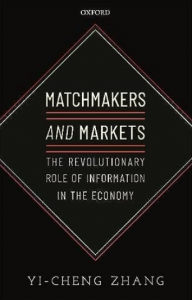I was quite excited by the prospect of reading Matchmakers and Market: The Revolutionary Role of Information in the Economy by Yi-Cheng Zhang. But it didn’t quite work for me, perhaps because the intended audience isn’t clear. The reason for excitement is clear: what the digital economy does is change the possibilities for the use of information in production and consumption. As the classic Hayek article observed, ‘the use of knowledge in society’ is the fundamental challenge of economic organisation. Yi-Cheng Zhang is a physicist and more relevantly the honorary director of Alibaba’s Complexity Research Centre. I hadn’t heard of this but it sounds like it should be delivering some very interesting insights.
However the book – very short – is written in a non-technical manner about how digital platforms operate. It’s key point is a concept labelled ‘infocap’, a sort of possibility frontier for the economic agent’s knowledge. There is an information asymmetry between individuals (who can’t know all there is to know about a firm’s products) and firms (who do know this but can’t know all about an individual’s range of preferences, although they can try to alter these). This is an interesting lens on the familiar platform economics but I think people who have read about platforms will not find much new, while although there are no equations the writing is a bit dense for non-specialists who haven’t read the platforms literature. (There are also loads of typos, so presumably the book wasn’t copyedited. I’m the kind of reader who feels the need to take up a pencil and correct these as I go.) I wish the book had actually been more formalized to highlight what might be new.
So, in short, I’d direct economists to the Belleflamme and Peltz text, The Economics of Platforms, and non-economists to a general read such as Platform Revolution by Marshall Van Alstyne, Geoffrey Parker and Sangeet Paul Choudary, or Cusamano, Gawer and Yoffe’s The Business of Platforms.

